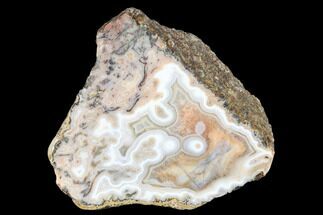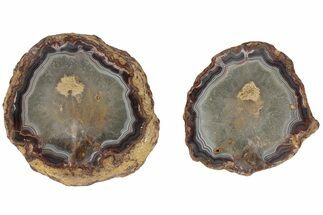This Specimen has been sold.
11.2" Colorful, Polished Seam Agate Slab - Kerrouchen, Morocco
This is a gorgeous polished agate nodule section that was collected from the Khenifra Province of Morocco. It features hanging stalactite formations, as well as plumes that formed at the base of the cavity. These plumes are encapsulated in layers of red and pink agate with a quartz/agate center. One side of this specimen has been cut flat and polished to a glossy finish, while the other side and outer edge have been left rough.
This large agate specimen comes with a display stand.
This large agate specimen comes with a display stand.
Banded agate nodules from Kerrouchen (also spelled Karouchen or Kerrouchene) are known for their intense red, pink, white, yellow, orange and brown agate hues. They formed as nodules from silica and iron-rich fluids within Triassic-age basaltic rock. These nodules can reach upwards of 12 inches wide and can be collected from the basalt itself. More commonly, they're collected from apple farms in the valleys where farming processes expose these nodules that erode from the basalt. Both nodular and vein/seam agates come from this region.
Agate is a variety of microcrystalline quartz (chalcedony) that displays translucence and, in some cases, banding. Agate primarily forms when silica-rich fluids fill pockets within rocks and/or fossils, depositing the silica along the walls of the rock. This process can result in banding patterns, as the compositions and impurities of these depositing fluids change over time. These banding patterns can either form as flat layers, creating linear patterns known as waterline agate, or as rounded layers, forming more common ring-like patterns. These patterns depend on the surfaces available for deposition.
Agate is a variety of microcrystalline quartz (chalcedony) that displays translucence and, in some cases, banding. Agate primarily forms when silica-rich fluids fill pockets within rocks and/or fossils, depositing the silica along the walls of the rock. This process can result in banding patterns, as the compositions and impurities of these depositing fluids change over time. These banding patterns can either form as flat layers, creating linear patterns known as waterline agate, or as rounded layers, forming more common ring-like patterns. These patterns depend on the surfaces available for deposition.
SPECIES
Chalcedony var. Agate
LOCATION
Kerrouchen, Khenifra Province, Morocco
SIZE
11.2 x 5.4", up to 1.6" thick
CATEGORY
SUB CATEGORY
ITEM
#181262
 Reviews
Reviews













